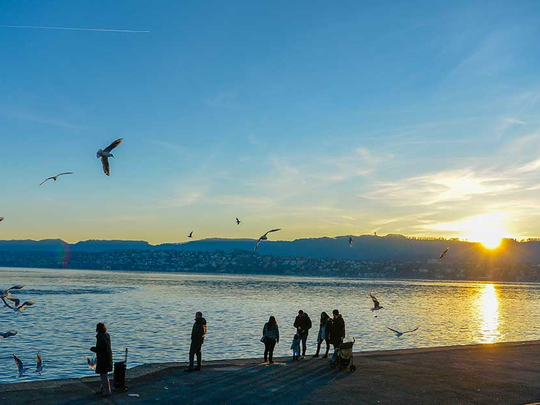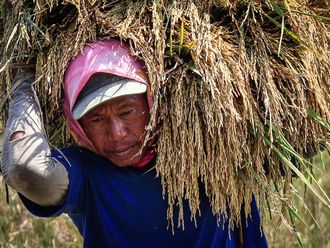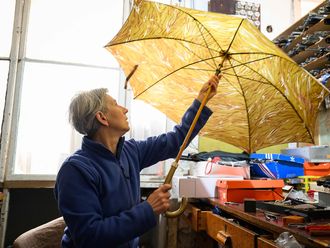
Dubai: Switzerland has experienced its warmest December since the country that founded winter tourism began keeping records 150 years ago.
Clear skies and dry ground have seen the Alpine nation end the year 3.4C above the long-term historical average for December, a climatologist for the federal office of meteorology and climatology (MeteoSwiss) said on Monday.
“There’s no doubt about it,” Stephan Bader said. “It’s the warmest December in our recorded measurements dating back to 1864 – clearly. And it’s especially pronounced at higher altitudes.”
The dry warmth and slopes bereft of snow have hurt resort owners and ski lift operators, who are already contending with Switzerland’s strong currency discouraging foreign visitors.
MeteoSwiss earlier this month said it expected 2015 to break the annual record for the third time in just a handful of years.
Globally, this year will be the warmest on record and 2016 could be even warmer due to the El Nino weather pattern, the World Meteorological Organisation said last month. It warned that inaction on climate change could see global average temperatures rise by 6C or more.
It came as climate scientists in France said that this year’s El Nino was the strongest ever measured, surpassing the one in 1997-98, both in terms of ocean surface temperature — up by more than 3C — and the surface area affected.
“It is probably the most powerful in the last 100 years,” said Jerome Lecou, a climate expert at the French weather service Meteo France, noting that accurate measurements have only existed since the mid-20th century.
But the spring-like temperatures that have disappointed many skiers hoping to find a blanket of fresh powder in the French Alps is having a far more painful impact on resort workers: unemployment.
Seasonal workers set to run ski lifts and clean hotel rooms across France’s assortment of world-famous slopes have seen jobs delayed or cancelled as employers wait to see if snow will fall.
“There are a lot of people in my position,” said Julien, a ski patrolman, who had just learned his job offer in Aussois in the French Alps had been deferred by 12 weeks.
The 23-year-old, who is also a nurse, said the uncertainty was “tough to handle”.
Temperatures have hit record highs around Europe in recent weeks, reducing usually sparkling snow-dusted mountains from France to Russia to muddy tracks or requiring that they be covered in manmade powder.
It has been an unusually hot year so far. According to experts at the National Oceanic and Atmospheric Administration in the United States, the period worldwide from January to November 2015 was the hottest recorded since 1880.
At Aussois, a resort perched at an altitude of 1,500 metres, the dearth of snow has meant that six seasonal workers who were promised jobs have yet to start drawing a wage.
Julien said he had pre-paid for a month’s lodging in the mountains that he could not use because his starting date was postponed.
The union representing workers at the resort has asked local authorities to pressure management to create part-time positions in order to get more people to work.
But like abundant snow, a helping hand from management at the small-scale resort has yet to materialise.
“We all offered to do fewer hours so that the others would be hired, but management refused,” said Francois Xuereb, 32, a seasonal worker and union delegate at Aussois.
The situation is better at bigger resorts like Menuires or Meribel a little further north, where unions reported that everyone who had been promised a job had got one.
At L’Alpe d’Huez, another resort popular with both French and foreign snow aficionados, around 300 seasonal workers are already on the job, after some “minor” adjustments to their duties, said Christophe Monier, general manager of the company that operates the property.
In December 2014, unseasonably warm temperatures already prevented the ski season from getting into full swing in Austria and Switzerland, home to some of Europe’s most popular slopes.
Then a massive storm dumped heavy snow just days after Christmas, stranding some 15,000 people overnight in the French Alps while skiers revelled in the fresh powder blanketing the slopes.
Some workers on the French slopes are holding out hope that Mother Nature will come through again in the end.
“We shouldn’t exaggerate the situation,” said Carole Pierre, a seasonal worker at Valmorel, where staff have accepted a 30 percent cut in working time and pay in order to keep their jobs.
“If in three weeks the snow still hasn’t arrived and the mild weather prevents us making artificial snow, we’ll go to half-time work,” she said.
“In the long run, the situation will favour high-altitude resorts,” she said, referring to spots with cooler climes.












